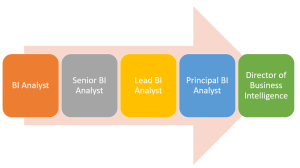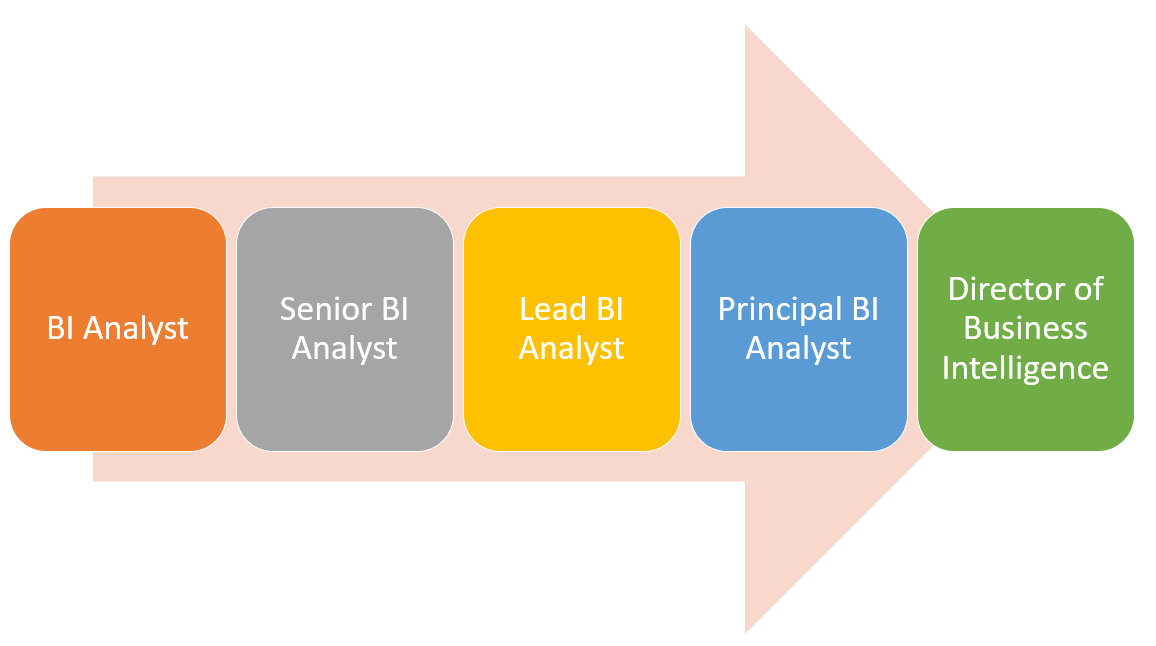
Are you interested in a career that combines data analysis, technology, and business strategy? Look no further than the role of a Business Intelligence (BI) Analyst. In this blog post, we will explore the career path/career roadmap of a BI Analyst, highlighting the various job titles, and discussing the skills and responsibilities associated with this in-demand profession.
What is Business Intelligence?
Business Intelligence (BI) refers to the process of collecting, analyzing, and interpreting data to gain valuable insights that drive informed business decisions. It is an umbrella term that encompasses the tools, methodologies, and processes used to transform raw data into meaningful information and actionable insights. It involves the collection, analysis, and interpretation of data from various sources within an organization to provide valuable insights that support strategic decision-making and improve overall business performance.
To better understand the concept, let’s consider an example of how Business Intelligence can help in overall business strategy:
Imagine a retail company that operates both physical stores and an e-commerce platform. They want to identify the key factors driving sales and customer satisfaction to optimize operations and improve profitability. Through implementing Business Intelligence, they can collect data from various sources such as sales transactions, customer feedback, website analytics, and inventory management systems. Using Business Intelligence tools and techniques, the company can analyze this data to identify patterns, trends, and correlations. For instance, they may discover that certain products have higher sales volumes during specific seasons or that customers who purchase a particular item are more likely to return for future purchases. They may also uncover insights about customer demographics, preferences, and behavior, effectively helping them tailor marketing campaigns and product offerings to target specific segments. With this information, the retail company can make informed decisions regarding inventory management, pricing strategies, marketing campaigns, and store layouts.
What does Business Intelligence (BI) Analyst do?
A Business Intelligence (BI) Analyst plays a crucial role in this process by utilizing various tools, frameworks, and techniques to extract actionable information from complex datasets. They work closely with stakeholders to identify business needs, develop analytical strategies, and present findings in a clear and meaningful manner. BI Analysts translate data into valuable insights that empower organizations to optimize performance, identify trends, and make data-driven decisions.
Career Path / Career Roadmap of a BI Analyst
To become a Business Intelligence (BI) Analyst, there is no specific educational qualification required. However, having a bachelor’s degree in Computer Science, Information Systems, Data Science, Statistics, Mathematics, or Business Administration can be advantageous. It is beneficial to possess a strong understanding of data analysis, statistics, database management, and business processes. Proficiency in data visualization tools and programming languages can prove to be valuable. Practical experience, hands-on projects, and obtaining relevant certifications can further enhance your skills and prospects as a BI Analyst.
The following represents the career path or career roadmap of a BI analyst:

- BI Analyst: The journey begins as a BI Analyst, where professionals with 2 to 4 years of experience enter the field. In this role, they develop foundational data analysis and reporting skills using tools like SQL, Excel, and data visualization software. BI Analysts analyze data to generate insights, create visualizations, and support decision-making processes.
- Senior BI Analyst: After gaining experience as a BI Analyst, professionals progress to become Senior BI Analysts. With 2 to 4 additional years of experience, they deepen their analytical expertise and expand their toolkit. Senior BI Analysts utilize advanced analytics techniques, statistical tools (e.g., R, Python), and data modeling to uncover deeper insights. They also work on complex data projects, collaborating with cross-functional teams to provide strategic recommendations.
- Lead BI Analyst: With 5 to 7 years of experience, professionals can transition into Lead BI analysts. As Lead BI Analysts, they not only excel in data analysis but also take on leadership responsibilities. They manage teams of analysts, oversee data-driven strategies, and ensure the successful implementation of BI initiatives. Additionally, they play a key role in guiding and mentoring junior team members.
- Principal BI Analyst: With 8 to 10 years of experience, individuals can reach the level of Principal BI Analyst. This senior-level position involves managing multiple teams, spearheading high-level strategic initiatives, and driving the organization’s data strategy. Principal BI Analysts possess a deep understanding of data management, including data integration, data quality, and master data management. They may also have expertise in big data technologies and cloud platforms, enabling them to leverage emerging technologies for enhanced insights.
- Director of Business Intelligence: The pinnacle of a Business Intelligence Analyst’s career is to become a Director of Business Intelligence. This role requires a significant amount of experience, typically exceeding 10 years. Directors of Business Intelligence need to have a holistic understanding of business operations, technology trends, and analytics strategies. They should have a track record of successful data-driven initiatives and be proficient in stakeholder management, budgeting, and strategic decision-making.
Conclusion
The career path of a BI Analyst offers a rewarding journey for professionals interested in data analysis, technology, and business strategy. Starting as a BI Analyst, individuals progress to become Senior BI Analysts, Lead BI Analysts, and Principal BI Analysts and potentially reach top leadership positions as Director of Business Intelligence. Throughout this path, BI Analysts gain expertise in various tools, frameworks, and techniques, enabling them to extract valuable insights from data and drive informed decision-making. As businesses increasingly rely on data-driven strategies, the demand for skilled Business Intelligence Analysts continues to grow, making it an exciting and promising career choice.
- The Watermelon Effect: When Green Metrics Lie - January 25, 2026
- Coefficient of Variation in Regression Modelling: Example - November 9, 2025
- Chunking Strategies for RAG with Examples - November 2, 2025

I found it very helpful. However the differences are not too understandable for me